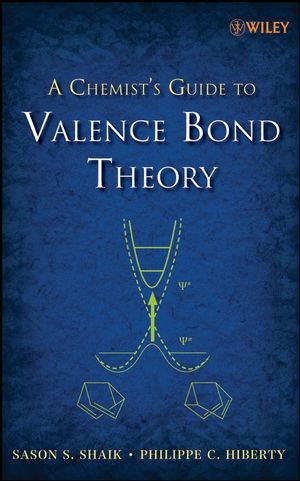A Chemist's Guide to Valence Bond TheoryISBN: 978-0-470-03735-5
Hardcover
336 pages
December 2007
 This is a Print-on-Demand title. It will be printed specifically to fill your order. Please allow an additional 10-15 days delivery time. The book is not returnable.
|
||||||
Modern valence bond theory and state-of-the-art methodologies
Since the 1980s, valence bond (VB) theory has enjoyed a renaissance characterized both in the qualitative application of the theory and in the development of new methods for its computer implementation. Written by leading authorities, this is the premier reference on current VB theory and applications in a pedagogical context, perhaps the first such attempt since Pauling's The Nature of the Chemical Bond. After an introduction, A Chemist's Guide to Valence Bond Theory pre-sents a practical system that can be applied to a variety of chemical problems in a uniform manner. Concise yet comprehensive, it includes:
*
A tour of some VB outputs and terminology
*
An explanation of basic VB theory
*
A discussion of various applications of the VB method to chemical problems, encompassing bonding problems, aromaticity and antiaromaticity, the dioxygen molecule, polyradicals, excited states, organic reactions, inorganic/organometallic reactions, photochemical reactions, and catalytic reactions
*
Samples of inputs/outputs and instructions for interpreting results
*
A short programmable outline for converting molecular orbital wave functions to VB structures
*
A guide for performing VB calculations
Complete with exercises and answers at the end of chapters, numerous solved problems, and a glossary of terms and symbols, this is the authoritative guide for computational chemists, chemical physicists, and research chemists in organic and organometallic/inorganic chemistry concerned with reactivity and molecular structure. It is also an excellent text for advanced undergraduate and graduate students.
Since the 1980s, valence bond (VB) theory has enjoyed a renaissance characterized both in the qualitative application of the theory and in the development of new methods for its computer implementation. Written by leading authorities, this is the premier reference on current VB theory and applications in a pedagogical context, perhaps the first such attempt since Pauling's The Nature of the Chemical Bond. After an introduction, A Chemist's Guide to Valence Bond Theory pre-sents a practical system that can be applied to a variety of chemical problems in a uniform manner. Concise yet comprehensive, it includes:
*
A tour of some VB outputs and terminology
*
An explanation of basic VB theory
*
A discussion of various applications of the VB method to chemical problems, encompassing bonding problems, aromaticity and antiaromaticity, the dioxygen molecule, polyradicals, excited states, organic reactions, inorganic/organometallic reactions, photochemical reactions, and catalytic reactions
*
Samples of inputs/outputs and instructions for interpreting results
*
A short programmable outline for converting molecular orbital wave functions to VB structures
*
A guide for performing VB calculations
Complete with exercises and answers at the end of chapters, numerous solved problems, and a glossary of terms and symbols, this is the authoritative guide for computational chemists, chemical physicists, and research chemists in organic and organometallic/inorganic chemistry concerned with reactivity and molecular structure. It is also an excellent text for advanced undergraduate and graduate students.



